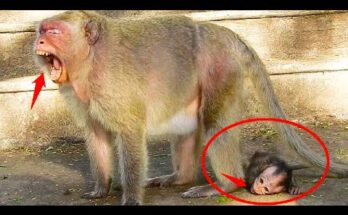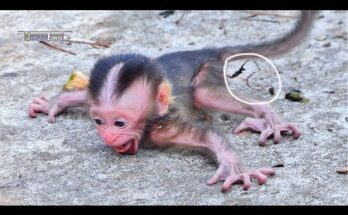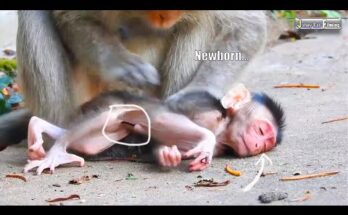In the heart of the jungle, where the sun filters softly through the dense canopy of trees, a tiny baby monkey lies cradled in the arms of his mother. His small body is frail, and his fur is patchy, a sign of his weakness. His eyes, though large and round, reflect a deep sadness, and his cries—soft and pitiful—echo through the underbrush. This baby monkey is hungry, and it is the most desperate hunger imaginable. It is a hunger not just for food, but for the strength he has yet to find in himself.
From the moment he was born, things had not gone well for this little one. Unlike the other babies in the troop, who seemed to bounce into life with eager energy and a natural instinct to explore, this baby remained weak. His mother, although caring, was inexperienced. She had not yet learned the ways of motherhood, and her lack of confidence only seemed to amplify the baby’s struggles. He struggled to nurse, and when he did, it was never with the strength or vigor his peers showed. His mother, frustrated and uncertain, would nudge him gently, coaxing him to feed, but the baby’s body refused to respond in kind.
The other members of the troop looked on with pity. They could see the baby’s struggle to stay close to his mother, who was often distracted, unsure, and sometimes even absent in her care. The other mothers, with their healthy, bouncing babies, would look at the little one with a mixture of sympathy and concern. It was an uncomfortable silence that followed the baby wherever he went, as though even the trees themselves held their breath in worry.
The jungle is a place of fierce competition, and for a baby monkey, hunger is the greatest enemy. The young monkey’s frailty made him easy prey to the relentless pressure of survival in the wild. While his siblings from other families would scramble through the trees, gathering fruit and playing with abandon, the baby monkey lay still, his hunger gnawing at him. Every now and then, he would attempt to reach out for food, his hands trembling, but his efforts were clumsy and weak. Often, his mother would try to help, but it was clear she was struggling to keep up with the demands of nurturing him.
Day by day, the baby grew weaker. His ribs became more pronounced, and his skin took on a duller hue. The once exuberant calls of the troop’s babies faded into the background as the weak baby’s cry became a constant reminder of his desperation. The lack of proper nourishment meant he had little energy to explore, to learn the skills that other baby monkeys developed instinctively. His muscles remained undeveloped, his movements slow and uncertain, a far cry from the agility of the healthy young monkeys in the troop.
Even the mother, who had tried so hard, began to lose hope. She watched the other monkeys with their healthy young ones and wondered if there was something wrong with her baby. He was so small, so frail, and so persistently hungry. She did her best, but in her heart, she feared the worst. The jungle, in all its beauty, can also be merciless.
But the baby monkey, despite the hunger and weakness that seemed to consume him, continued to fight. In those small, pitiful moments, when his mother would gather what little food she could find and place it near his lips, he would eat—just enough to stay alive, just enough to hang on. His body didn’t thrive, but it didn’t give up, either.
And perhaps that is the most extraordinary thing about the story of the very pity baby monkey: despite being hungry, weak, and vulnerable, he held on. He held on to life, to his mother, and to the fragile hope that one day, he would be strong enough to climb the trees and join his troop. His struggle, though painful and filled with uncertainty, was also a testament to the resilience of life itself, a reminder that even in the face of great hardship, survival is a fight worth enduring.


